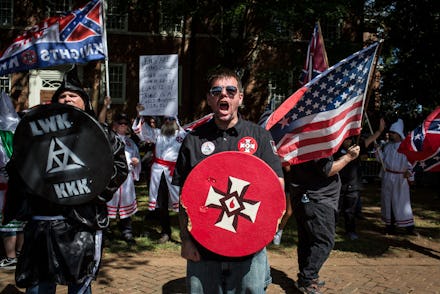A timeline of major 2017 pro-Trump, anti-Trump clashes before Charlottesville

The hate-filled, racially-charged violence in Charlottesville, Virginia, on Saturday was far from the first violent culture war clash in 2017.
Since Election Day, so-called alt-right white nationalists like Richard Spencer and their allies, apparently emboldened by president Trump’s White House win, have staged at least a dozen similar conservative rallies in multiple major cities.
The alt-right demonstrators are frequently confronted by anti-Trump progressive groups, including militant antifa and anarchist factions.
There have been pro-Trump “free speech” rallies in progressive centers and on college campuses, conservative monument protests, and so-called anti-Sharia demonstrations.
Spokesman Ryan Lenz of the Southern Poverty Law Center, a hate group watchdog, says the white nationalists’ goal for these events is to capitalize on the election of Trump and his nationalist rhetoric to recruit more mainstream white Americans to join their racist cause.
“Since Trump’s election, the nascent alt-right has tried very hard to engage in a real-world venue to confront the left,” Lenz said Tuesday. “Increasingly the alt-right is finding they have managed to trigger extreme elements of the left into confrontations, the likes of which we are seeing more and more.”
Antifa’s objective, according to Lenz has been to prevent so-called conservative “fascists” from publicly espousing their political views.
“[The] more militant elements of the left have come out and engaged in violence to silence,” Lenz said.
Here’s a timeline of what’s happened since Trump took office.
Feb. 1: “Milo” comes to Berkeley, California
The University of California at Berkeley has been ground zero for the pro-Trump, anti-Trump culture war, with at least three violent clashes taking place there since Trump’s inauguration.
The first was when notorious internet troll and former Breitbart writer Milo Yiannopoulos was invited by college Republicans to host a speaking engagement on campus.
Progressive groups argued Yiannopoulos promotes hate speech and tried to shut down the event, which ultimately was canceled for safety concerns before protesters, including members of “black bloc,” fought with police and set fire to trash in the streets.
March 1: Battle of Berkeley I
Conservatives and alt-righters outraged that Yiannopoulos’ event had to be canceled staged a “free speech” rally in Berkeley a month later. They, too, were confronted by antifa protesters, which led to a brawl dubbed the “Battle of Berkeley.”
During the rally, a riot-gear wearing, shield-wielding Trump supporter named Kyle Chapman was filmed cracking an antifa demonstrator over the head with a stick.
Alt-right web trolls dubbed him “Based Stickman the Alt-Knight” and made him a pseudo internet celebrity. Since then, other costume-wearing, stick and shield-wielding alt-righters, including the helmeted “Based Spartan” have shown up to battle antifa protesters.
April 1: Battle of Berkeley II
An all-out riot ensued during a pro-Trump Patriot Day rally on April 15, when alt-right organizers hosted another free speech Berkeley rally.
Literal fireworks were launched and at least 20 people were arrested.
April 27: Battle of Berkeley III
Conservative pundit Anne Coulter’s speaking engagement was canceled due to safety concerns. At least seven people were arrested.
May 1: May Day riots - Portland, Oregon
The annual pro-labor progressive march through major cities across the U.S. were disrupted by black bloc Antifa members in Portland, Oregon. They smashed windows, set fires and chucked Pepsi cans at police, drawing criticism from their less radical progressive allies and further antagonizing alt-right sympathizers who cried foul.
May 7: Battle of New Orleans
Multiple arrests were made as white nationalists and neo-Confederate sympathizers clashed with progressive protesters over the New Orleans City Council’s decision to take down a statue of Robert E. Lee.
May 13: Charlottesville, Virginia
The first of three Charlottesville, Virginia, demonstrations so far was led by alt-right leader Richard Spencer, whose tiki torch-carrying followers lit up a city park on May 13.
They were protesting the city’s decision to take down a statue of Confederate Gen. Robert E. Lee.
June 4: Portland, Oregon free speech rally
Libertarian activist Joey Gibson and hundreds of his alt-right allies hosted another Pro-Trump free speech rally in the city of Portland, which took place less than two weeks after a white nationalist that previously attended one of Gibson’s rallies fatally stabbed two men in the neck who were defending two women of color on a commuter train.
Violence eventually broke out at the June 4 rally after flash bang grenades went off and police began arresting antifa demonstrators at an adjacent protest.
June 10: March against Sharia - Denver
Four arrests were made at the Colorado state capitol building in Denver when the alt-right’s Proud Boys joined Bikers against Radical Islam to organize an anti-Sharia rally where they were confronted by progressive demonstrators.
July 8: Charlottesville KKK rally
The Ku Klux Klan, which recently consolidated its forces to capitalize on the increasing popularity of white nationalism, staged their own pro-monument protest in Charlottesville on July 8 where their members engaged in several skirmishes with progressive activists.
Aug. 12: Charlottesville’s “Unite the Right” rally
Heather Heyer was killed and many more people were injured after a car driven by a white nationalist ran over progressive activists counterprotesting the white nationalist Unite the Right rally on Saturday.
Violence not just confined to protests
In addition to Heyer, several other people, including Timothy Caughman and Richard Collins III, have been killed during hate-fueled lone wolf attacks by white nationalist sympathizers.
Progressive radical James T. Hodgkinson shot multiple people at a Republican baseball on June 14 before police fatally shot him as well.
Lenz says the alt-right are planning future events like the one in Charlottesville across the U.S.
“They have increasingly moved into public forums to coalesce around issues that cut right to the heart of white nationalism in America,” he said.